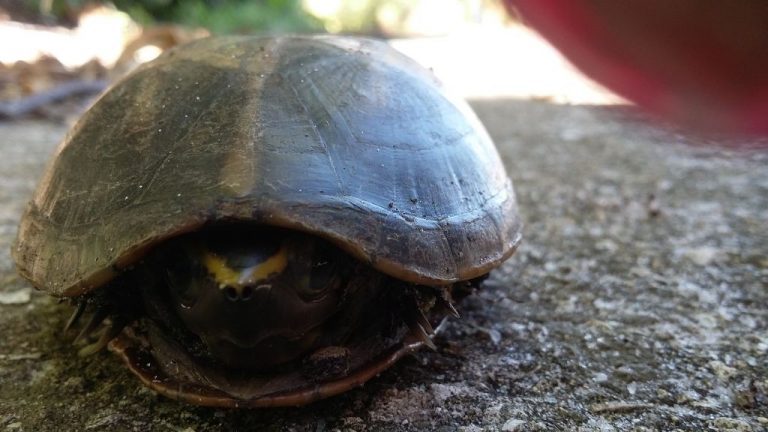When you own turtles, you may have noticed that they make various sounds, especially hissing noises. It may be confusing for some turtle owners who don’t know why they hiss, especially when they feel like there was nothing that triggered the noise.
So if you’re wondering “what does it mean when a turtle hisses”, read on! I’ll show you what the hiss is like and why it happens.
Table of Contents
About the Turtle Hissing
Did you know that turtles have NO vocal cords? That means when turtles hiss, they don’t use any vocal cords at all, compared to other animals that do. Take note that this goes for almost all turtle species and happens to a lot of pet owners!
The hissing sounds actually come from the air that’s expelled from the turtle’s lungs. The only time the hissing sounds happens is when they would retract back to their shells very quickly. When retracting back to their shells, they’ll have to make room for their limbs and head, doing so by removing any excess air from their lungs.
When they remove all excess air from their lungs, it produces a hissing sound involuntarily. So the turtle doesn’t know they create the sound, it just happens because of the action!
The hiss also prevents the turtle from damaging as they go back inside their shell. If ever the air won’t be expelled as the turtle goes in, the turtle would hit its lungs each time this happens. This can cause health issues and lung damage in the long run, especially since turtles usually go inside their shells quickly to hide from any “threats” frequently throughout the day.
To put it in more detail, think of your turtle’s lungs as a balloon filled with a lot of air. When you allow small quantities of its air to go out for longer periods, then it won’t produce much of a sound.
But when you squeeze it to force air out immediately, it creates a lot of noise, which can sound like a hiss, too! That’s why you only hear turtles hiss when they go back inside their shells quickly.
So when a turtle seems to hiss at you, don’t worry, as this doesn’t always indicate hostility or belligerence. It’s actually from pure fear and not a way to alarm or warn you. This situation is comparable to you crying out in fear and trying to retreat from scary or surprising situations.
Read more: Can Box Turtles Eat Oranges? What You Can and Can’t Feed
What Does It Mean When a Turtle Hisses?
Now that you know how the hissing sound is produced, you can learn why turtles hiss when you discover why they need to retract to their shells quickly.
Turtles would retract to their shells when they feel scared for whatever reason. They may have heard a strange sound, feel something appearing near them, or sense any other threat. Basically, they go back in their shells to hide and find shelter from whatever they were scared of.
But besides turtles hissing to hide from predators and to prevent hurting themselves as they go in their shells, there’s another purpose!
Turtles also hiss to intimidate potential attackers or threats. The hiss isn’t scary (for us, maybe), but it helps the turtle intimidate any other animal that looks like it’s about to attack.
Turtles defend themselves by retracting to their shells quickly and wait for the perfect time to attack. When they see an opportunity to do so, they quickly get out of their shells to bite and then go back to their shells.
Each time they go back in their shells, it produces a loud hiss. This further intimidates any attacker and is a warning sign for them to leave. The hiss may not be effective alone, but when combined with the turtles’ defense and bite, it can be efficient, depending on the animal they are attacking or defending themselves from.
What if you were the one that touched your turtle and it hissed?
When your turtle hisses when you interact with it, it simply means they are scared. They get easily scared and aren’t the bravest animals around, so you have to be wary during the first few weeks. After all, they’re in a whole new environment with different animals and people, so it takes time to get used to the new place and noise.
After a few weeks, they’ll feel less scared, producing the hissing sound and retracting to their shells less.
Because of their fear, they may attempt to bite you, so you have to watch out for that. You need to learn how to interact with your turtles properly to avoid them from fearing and biting you in the long run.
Do you want to learn more about why turtles hiss? Check out this informative video:
Wrapping It Up
When turtles, hiss, you may be a bit surprised, as it sounds different from that of other animals. But usually, the hissing is involuntary so there’s nothing to worry about. If you do feel like you triggered them to defend themselves to create a warning hiss, it’s best to leave them be.
I hope that this article answered your question, “what does it mean when a turtle hisses?” Now that you know the answer, be sure to avoid doing anything that can trigger their hisses.

